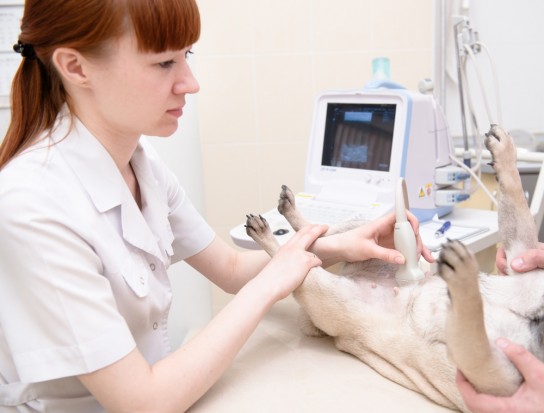Inflammatory Bowel Disease (IBD) is a group of syndromes affecting the gastrointestinal tracts of dogs and cats. IBD can affect any part of the small or large intestine, and can involve different inflammatory cells including eosinophils, plasma cells, and lymphocytes.
IBD arises most commonly in middle-aged or older animals of either sex. German Shepherds, Boxers, Yorkshire Terriers, and Wheaten Terriers seem more susceptible to the disorder. We aren't aware of any breed predilection in cats.
It is thought that hypersensitivity reactions to an array of antigens - including foods, parasites, and bacteria in the gut - are behind disease development. This causes an abnormal immune reaction, which in turn causes inflammatory cells from the bloodstream to respond against the antigens. Although this response counteracts the offending substances, it also causes the disease process in the gut.
Symptoms of IBD include chronic diarrhea, vomiting, abdominal pain, weight loss, decreased appetite, and changes in hair coat. Decreased blood protein levels can result in low grade anemia and accumulation of abdominal fluid (ascites).
As a McKinney veterinarian, I perform basic diagnostics to rule out the other diseases that can cause similar symptoms. These diagnostics include fecal analysis, blood chemistry and CBC testing, and urinalysis. Additional procedures can include abdominal and thoracic radiographs, barium upper GI series and ultrasound. Salivary food sensitivity testing can detect reactions to food components, and can be very helpful in designing a therapeutic diet change.
Abnormal blood results can include anemia, low protein levels, elevations in inflammatory cells (gamma globulins) or eosinophils. However, these changes are non-specific, and do not lead to a diagnosis of IBD.
After a McKinney veterinarian has ruled out more common disorders, and IBD emerges as a possible diagnosis, the gold standard diagnostic procedure is biopsy of affected small or large intestine sections and possibly regional lymph nodes. Biopsy samples can be obtained during endoscopic evaluations of the colon and perhaps the lower intestinal tract, but usually cannot extend to the upper intestines. Surgical exploration of the abdomen allows direct visual examination of all tissues and enables more precise acquisition of appropriate tissue samples. The surgical approach is more invasive but is generally preferred by McKinney veterinarians when increased precision of sampling is desired.
Short of direct biopsy of affected tissues, therapeutic trial of medication and dietary change can be attempted in cases of suspected inflammatory bowel disease. Deworming for any possible intestinal parasites, anti-inflammatory medications, intestinal/colonic antibiotics, colonic immune modulating medications, and a hypoallergenic diet are generally the therapeutics employed.
Diet changes, anti-inflammatory medication, and possibly other medications may be required long term to maintain control over the disease, as there is not a direct or permanent cure for IBD.
IBD is an unfortunate set of disorders that can cause long term discomfort and disease in patients if not corrected. Diagnosis usually involves several diagnostic procedures; although the process can be time consuming and frustrating until answers are finally found, the end reward is seeing the patient relieved of discomfort and regaining a healthy appetite and normal stools!
McKinney animal Hospital
Stonebridge Animal Hospital
5913 Virginia Parkway
McKinney, Texas 75071
469-507-2433

 Keeping An Axolotl As A Pet
Keeping An Axolot
Keeping An Axolotl As A Pet
Keeping An Axolot
 Include Nutrients In The Feed For Horses With Ulcers
Include Nutrients In The Feed For Horses With Ulcers
Include Nutrients In The Feed For Horses With Ulcers
Include Nutrients In The Feed For Horses With Ulcers
 Five Common Questions From Dog Owners About Vaccinations And Boosters
Five Common Quest
Five Common Questions From Dog Owners About Vaccinations And Boosters
Five Common Quest
 Unwanted Pregnancies In Dogs - What You Should Do
Unwanted Pregnanc
Unwanted Pregnancies In Dogs - What You Should Do
Unwanted Pregnanc
 Living With A Dog As A Contact Sport
Dog Ownership is a Hands-On Job
It never ceases to amaz
Living With A Dog As A Contact Sport
Dog Ownership is a Hands-On Job
It never ceases to amaz